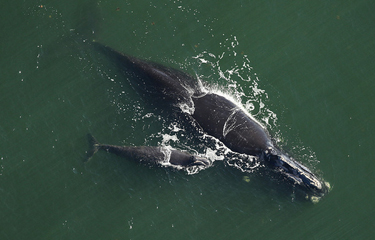Maine lobster industry, officials push back against federal right whale protection plans

The U.S. state of Maine’s lobster industry, in addition to some state officials, are pushing back against proposals requiring fewer vertical lines in the industry in order to protect the endangered North Atlantic right whale.
At a meeting on 6 November, Maine’s Department of Marine Resources Commissioner Patrick Keliher called the state’s counter-proposal – using weaker rope and more traps per line in deep waters – the “line in the sand,” according to the Portland Press Herald. The state has been fighting back against the federal government’s proposal to reduce lines by 50 percent, a proposal that the state’s governor, Janet Mills, called “foolish.”
The state proposed a counter plan that would require weaker rope and more traps per vertical line, but that proposal is still in limbo.
“This is our line in the sand,” Keliher said. “If they don’t accept this, based on the conversation I had with the governor today, I’m sure we’re going to be in a federal court fighting this out.”
The stance taken by Maine comes in the wake of an earlier ruling by a federal judge regarding right whale protections. On 29 October, Judge James Boasberg of the U.S. District Court for the District of Columbia ruled that two fishing areas in New England should remain closed to certain gear types to protect right whales, according to the Associated Press.
The ruling determined that gillnet fishing in two areas off of Nantucket, Massachusetts will remain banned until the government has complied with the Endangered Species Act.
Environmentalists got another win from the same court later in the same week, as the same judge – Boasberg – ruled that environmental groups can continue a lawsuit against the U.S. government that claims the government has failed in its duty to adequately protect the right whales, according to the Associated Press.
Keliher said that if Maine’s counter-proposal is not accepted, the state will likely end up in court against the same organizations.
The stance by Maine is counter to that of some other states. The Massachusetts Attorney General has called for greater efforts to prevent more right whale deaths, despite the lobster industry in the state also calling for a closer look at the proposal.
Lobster fishermen in both Maine and Massachusetts have claimed that the entanglement issues that have caused whale deaths – such as a recent death off of New York – aren’t related to the gear they use. Most are blaming it on Canadian snow crab rope, Massachusetts Lobstermen Association President Arthur “Sooky” Sawyer told SeafoodSource in September.
“It’s Canadian snow crab rope, even some of the lobstermen up there are blaming it on the snow crab,” he said.
Maine’s proposed regulations involve adding weak points to lines, marking all gear to be distinct to gear used in other states – to prove Maine lobstering rope isn’t involved in right whale deaths – and adding reporting requirements for all lobstermen in the state. Currently, only 10 percent of state lobstermen are required to report landings, gear type, and fishing locations.
Keliher said that the state will submit its plan to the National Marine Fisheries Service later this month.
Photo courtesy of NOAA






Share